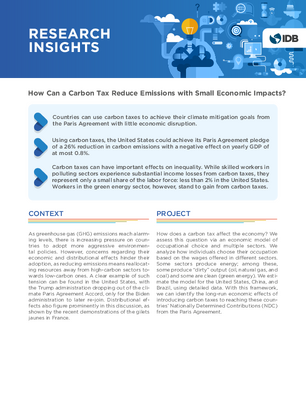Research Insights: How Can a Carbon Tax Reduce Emissions with Small Economic Impacts?
Date
Mar 2023
Publication
Countries can use carbon taxes to achieve their climate mitigation goals from the Paris Agreement with little economic disruption. Using carbon taxes, the United States could achieve its Paris Agreement pledge of a 26% reduction in carbon emissions with a negative effect on yearly GDP of at most 0.8%. Carbon taxes can have important effects on inequality. While skilled workers in polluting sectors experience substantial income losses from carbon taxes, they represent only a small share of the labor force: less than 2% in the United States. Workers in the green energy sector, however, stand to gain from carbon taxes.




